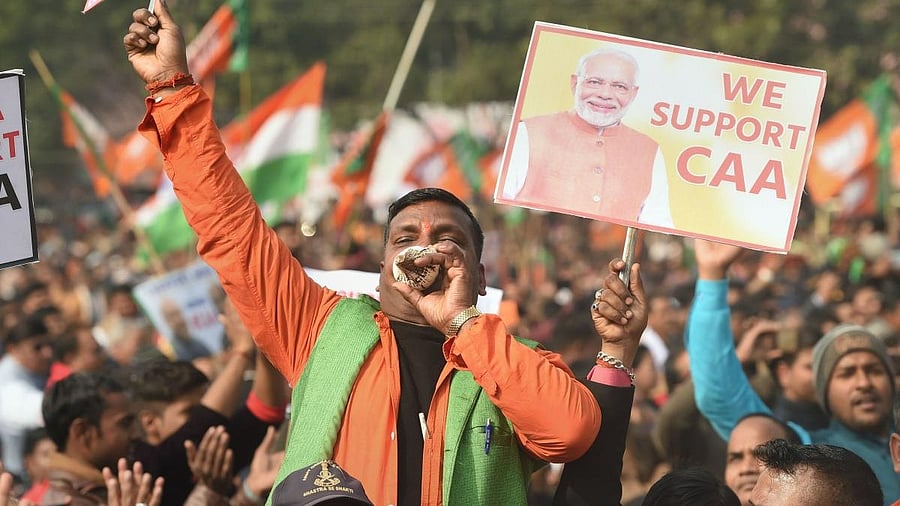
Pro-CAA rally
Credit: PTI File Photo
The political intent behind the implementation of the Citizenship Amendment Act (CAA) is clear from its timing and the unwillingness of the government to wait for the Supreme Court’s judgement on it.
Citizenship was granted to over 300 persons under the Act this week after the controversial law has been on the statute for over four years. At least 14 persons were handed their citizenship certificates at a well-publicised function in Delhi attended by senior government officials.
Politicians kept away perhaps because of the model code of conduct but the political claims were loud and clear. Prime Minister Narendra Modi has presented it as a ‘Modi ki guarantee’ and taken credit for it, asserting that the law is here to stay. It should be noted that the Supreme Court has yet to take a view on it, though it has refused to stay its operation.
The CAA grants citizenship to Hindus, Jains, Christians, Sikhs, Buddhists and Parsis who arrived in India on or before December 31, 2014, from Bangladesh, Pakistan and Afghanistan because of religious persecution. The government notified its rules in March, before the model of code of conduct came into force.
When the CAA was enacted, it saw the most opposition from Assam and the North-East. There were strong anti-CAA protests there as well as across the country.
But the protests lost steam when the Covid pandemic spread. The government has now chosen to implement the law after the polling for the Lok Sabha elections in Assam and other states in the region. Had it done so before the polling in those places, it would have had a negative impact for the BJP in those states.
At the same time, the law has been implemented just before the May 20 polling in some constituencies in Bengal where the Matua community, which came from Bangladesh, can enhance the BJP’s chances. The political and electoral intent behind the law thus becomes clear.
Propriety demanded that the government wait for the Supreme Court’s judgement on the law before implementing it.
The law has been challenged on grounds of discrimination and other issues that have a bearing on the idea of citizenship. It is among some important cases which have been pending with the court for a long time. There are at least 237 CAA-related cases before the court.
The latest petition is to cancel the citizenship certificates which were issued this week. Chief Justice of India D Y Chandrachud has said that petitioners will have the right to approach the court if the law is operationalised before the court decides on it. But an early decision is unlikely because the court will go into its vacation next week.
